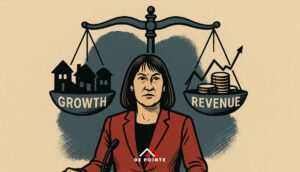Article

As the UK gears up for the 2024 general election, investors are closely monitoring the contrasting agendas of the major political parties to gauge potential impacts on various sectors. Here’s what you need to know to align your investment strategies with the evolving political landscape.
Stock Market Sensitivity to Political Changes
The performance of the stock market is highly sensitive to political outcomes, which can influence economic growth, corporate earnings, and investor sentiment. Conservative policies such as continuation of business-friendly measures and tax cuts could bolster large-cap companies and financial institutions, enhancing investor confidence and potentially leading to a bullish market. Conversely, Labour’s focus on increased public spending, higher corporate taxes, and stricter regulations might initially create market volatility. However, sectors like renewable energy and healthcare might thrive under Labour’s agenda.
Property Market Dynamics
Political decisions greatly affect the property market, impacting housing policies, taxation, and regulations. A Conservative victory could benefit property developers through relaxed planning regulations and boost urban property values. Labour’s commitment to affordable housing and potential rent controls could introduce short-term market uncertainties but might foster long-term growth in housing availability.
Investments in Individual Savings Accounts (ISAs)
ISAs remain a popular vehicle for tax-efficient savings in the UK. Conservative policies may maintain the status quo with tax advantages, supporting stability in ISA investments. Labour could reform ISAs to broaden access, potentially increasing uptake among lower-income groups.
Bond Market Forecast
The bond market’s stability is crucial for conservative investors and is influenced by fiscal policies and economic conditions. Conservative strategies focusing on reducing public debt and maintaining low interest rates suggest a stable outlook for government and corporate bonds. Labour’s higher public spending and borrowing could lead to increased government bond yields and foster interest in green and social bonds.
Cryptocurrency and Digital Assets
The future of digital assets in the UK could diverge significantly based on the election outcome. Conservative policies aim to establish the UK as a crypto hub, promoting growth through regulatory clarity. Labour’s approach might impose stricter regulations, which could initially disrupt the market but might ultimately lead to greater stability.
As the UK approaches the 2024 general election, the country’s wealthiest investors are adjusting their strategies to mitigate risks and capitalise on potential opportunities. The anticipation of varying election outcomes is prompting strategic diversification and cautious optimism among these investors.
- Maximising Tax-Efficient Vehicles: Wealthy investors are maximising their contributions to ISAs and reviewing pension plans to leverage current tax reliefs and allowances, shielding their investments from potential post-election policy changes (Express.co.uk).
- Diversification across Asset Classes: Recognizing the uncertainties brought by the election, many affluent investors are diversifying their portfolios across different asset classes and geographic regions. This approach aims to stabilise returns despite potential market volatility influenced by political changes (Fiduciary Trust).
- Long-Term Investment in Infrastructure: Both of the leading parties, Conservative and Labour, have expressed intentions to invest heavily in infrastructure. This has made infrastructure a potentially less volatile sector and an attractive long-term investment option for wealthy investors looking to benefit from guaranteed government spending (Express.co.uk).
- Preparedness for Market Shifts: Historical data suggests that while elections can influence market dynamics, the overall long-term impact on major asset classes like stocks has been positive regardless of the party in power. This historical resilience is why many wealthy investors maintain a long-term perspective, focusing less on short-term political changes and more on the broader economic fundamentals (Fiduciary Trust).
Overall, the strategies adopted by the UK’s wealthiest investors reflect a blend of cautious asset protection and strategic opportunism. They aim to safeguard their portfolios against short-term electoral uncertainties while positioning themselves to capitalise on the structural shifts that might follow the election outcomes. This approach underscores the importance of not letting transient political events dictate long-term investment decisions.






